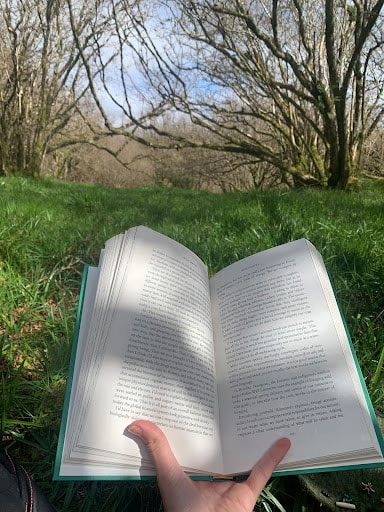WIld Service – Book review

I picked up my copy from a bookshop in Devon, just as I was heading to Dartmoor to lead a pilgrimage, a people’s perambulation to explore what the ‘commons’ really are, what they mean to us, and all the other life around us. It went with me to trace the route of the pilgrimage, as I sat by a river, and then as I headed up to the west coast of Scotland afterwards.
I dreamed with it in trees, drank from it in ancient mesolithic rainforest, sank into it in wetlands, was warmed by it by ancient standing stones. This is a book that I slowed my normally voracious reading pace down for and read chapter by chapter over many days.
Named after the wild service tree, one of the more prosaic-named trees of this island, if all the more bizarre because of it. It is a ‘rare and overlooked member of the rose family’, whose leaves are the shape of a human hand. An invitation perhaps, a greeting, or perhaps an outstretched palm of pleading, for connection, for recognition. A call to action, for all of us to take up our own strand of wild service, to weave together a future.
The facts and statistics about the state of nature in Britain are well-known and wholly depressing. As a nation of self-confessed nature lovers, we can feel helpless and lost in our search for meaningful action, and reconnection with the life we share this planet with. In this, Wild Service is a book of its time, offering different ways of looking at nature connection, and small, but practical things that are being done by people just like you and me. Not major landowners, not big NGOs, not the government. The folk of this island.
The book ranges far, exploring ideas around kinship and reconnection, stewardship and reciprocity, community, belonging and healing. It touches many issues that essentially boil down to the idea that we need to reframe our thinking – we are nature. We need to stop identifying with the behemoth systems that humankind has created and start recognising ourselves for what we are; ape, mammal, animal, nature.

There is a look to indigenous cultures around the world for threads of how we may shift our mindset and our relationship with the world. “We applaud indigenous cultures”, says Nadia Shaikh, “for how they caretake the land, and don’t apply that same possibility to ourselves”. Indeed, in mainstream culture, the idea that the land is something to be nurtured and given thanks for, to be cared for for itself, not just what resources we can extract, is as far from mainstream thinking as the recommoning Nadia calls for.
The idea of the land and life in common is a strong theme throughout the book, which wove beautifully throughout the pilgrimage I led on Dartmoor, and then the pilgrimage I undertook in Scotland. We have come to believe in the tragedy of the commons, through centuries of propaganda, being told that we, the common people, are the cause of all our world’s woes, people as out of place on the land as the plants that dare to grow where they are unwanted. Jon Moses tells us, “we see how the hatred of ‘weeds’ went hand in hand with the hatred of commoners, who, in the floral hierarchy of England, were appositely described by their antagonists as the ‘trash Weeds or Nettles’”.
We live in a country of squalidly low nature connection, and terrifyingly high nature destruction. Can this be of surprise to anyone, that one would lead to the other? How can anyone step into a role like that of an indigenous culture while we are separated from it, while behind fences and walls and hedges destruction continues apace?
Guy Shrubsole tells us that “re-enchanting the public is only the first step in training up a new generation of ‘nature’s whistleblowers’. […] As ramblers, kayakers, rebel botanists and trespassing naturalists, we, too, can bear witness to the destruction of nature that takes place behind barbed wire fences, and blow the whistle on these crimes”. Access is indeed the issue here, and those of us that can risk trespassing can take up the mantle of bearing witness, to raising the hue and cry when we see what is happening.
It’s not only this that we can do, there are many examples in the book of people being of service without risking themselves, whether creating a butterfly garden, planting poplars or engaging in rebel botany; there’s space for everyone, whether rural or urban, knowledgeable or newbie. All it takes is the will, and a bit of time.
Once we start on this path of wild service, we find ourselves in reciprocity, receiving and giving in equal measure, coming into relationship with instead of domination and extraction of.
“Reciprocity can be the work of a moment, or a life”, says Amy-Jane Beer, “but attention to the former tends to become the latter and really there’s not so much difference between the two”.
Our blog posts are written by our core team and guest bloggers. If you have an idea for a blog post please pitch it to us: info@wildcard.land
CAMPAIGNS
ARCHIVES
- March 2026
- February 2026
- December 2025
- November 2025
- October 2025
- September 2025
- August 2025
- July 2025
- June 2025
- May 2025
- April 2025
- March 2025
- February 2025
- December 2024
- November 2024
- October 2024
- September 2024
- August 2024
- July 2024
- June 2024
- March 2024
- February 2024
- January 2024
- December 2023
- November 2023
- August 2023
- July 2023
- May 2023
- February 2023
- January 2023
